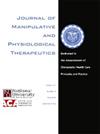Factors Predicting Nonadherence to Treatment Recommendations for Patients With Chronic Low Back Pain in India: A Cross-Sectional Survey
IF 1.4
4区 医学
Q4 HEALTH CARE SCIENCES & SERVICES
Journal of Manipulative and Physiological Therapeutics
Pub Date : 2023-06-01
DOI:10.1016/j.jmpt.2024.02.007
引用次数: 0
Abstract
Objective
The purpose of this study was to examine patients' expectations and factors that influence adherence to physiotherapists' treatment recommendations on chronic low back pain (CLBP).
Method
One hundred and forty seven patients with CLBP were included in this study. Predictive indicators including demographic information, views, expectations, and opinions regarding the health status and treatment expectations of patients were derived from questionnaires. The dependent outcome variables were the absence of trust in treatment recommendations provided by physiotherapists, the anticipation of treatment recommendations based on patient expectations, and the resistance to modifying expectations despite efforts by physiotherapists to persuade otherwise. The study was carried out between April 2022 and January 2023 in 2 regions located in India.
Results
Multivariate regression analyses show that age, expectations about diagnosis, preference for passive therapies and medical care, and information seeking behavior emerged as independent predictors of a lack of trust in physiotherapists' treatment recommendations. The information-seeking behavior of the patients’ alone predicted the anticipation of treatment recommendations based on patient expectations and the reluctance to alter those expectations despite the physiotherapists' persuasion.
Conclusion
Our results suggest that information seeking behavior is the most consistent independent predictor of treatment expectations that will align with physiotherapist recommendations. This indicates the importance of screening for such factors and the importance of patient education to optimize the management of CLBP. However, larger studies incorporating all variables associated with patient expectations in similar patient populations are needed to confirm these results.
印度慢性腰痛患者不遵守治疗建议的预测因素:一项横断面调查
研究目的本研究旨在探讨患者对物理治疗师关于慢性腰背痛(CLBP)治疗建议的期望以及影响患者遵从治疗建议的因素:本研究共纳入 147 名慢性腰背痛患者。通过问卷调查得出预测指标,包括人口统计学信息、对健康状况的看法、期望和意见以及患者对治疗的期望。因果结果变量包括:对物理治疗师提供的治疗建议缺乏信任、根据患者的期望预期治疗建议,以及在物理治疗师努力劝说下仍不愿改变期望。研究于 2022 年 4 月至 2023 年 1 月在印度的两个地区进行:多变量回归分析表明,年龄、对诊断的期望、对被动疗法和医疗护理的偏好以及寻求信息的行为是对物理治疗师的治疗建议缺乏信任的独立预测因素。患者的信息寻求行为单独预测了基于患者期望的治疗建议的预期,以及在物理治疗师的劝说下仍不愿改变这些期望:我们的研究结果表明,寻求信息的行为是预测治疗期望与物理治疗师建议相一致的最一致的独立因素。这表明了筛查此类因素的重要性,以及患者教育对优化慢性阻塞性脑脊髓膜炎管理的重要性。然而,要证实这些结果,还需要在类似的患者群体中进行更大规模的研究,纳入与患者期望相关的所有变量。
本文章由计算机程序翻译,如有差异,请以英文原文为准。
求助全文
约1分钟内获得全文
求助全文
来源期刊
CiteScore
3.00
自引率
7.70%
发文量
63
审稿时长
29 weeks
期刊介绍:
The Journal of Manipulative and Physiological Therapeutics (JMPT) is an international and interdisciplinary journal dedicated to the advancement of conservative health care principles and practices. The JMPT is the premier biomedical publication in the chiropractic profession and publishes peer reviewed, research articles and the Journal''s editorial board includes leading researchers from around the world.
The Journal publishes original primary research and review articles of the highest quality in relevant topic areas. The JMPT addresses practitioners and researchers needs by adding to their clinical and basic science knowledge and by informing them about relevant issues that influence health care practices.

 求助内容:
求助内容: 应助结果提醒方式:
应助结果提醒方式:


